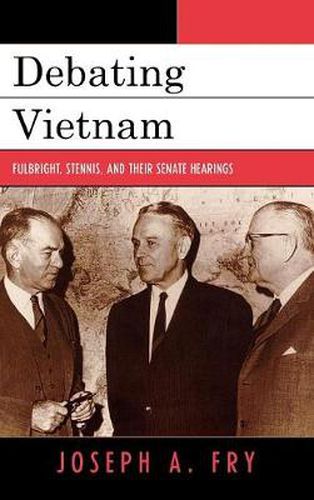Readings Newsletter
Become a Readings Member to make your shopping experience even easier.
Sign in or sign up for free!
You’re not far away from qualifying for FREE standard shipping within Australia
You’ve qualified for FREE standard shipping within Australia
The cart is loading…






In the midst of the Vietnam War, two titans of the Senate, J. William Fulbright and John C. Stennis, held public hearings to debate the conflict’s future. In this intriguing new work, historian Joseph A. Fry provides the first comparative analysis of these inquiries and the senior southern Senators who led them.
The Senators’ shared aim was to alter the Johnson administration’s strategy and bring an end to the war-but from dramatically different perspectives. Fulbright hoped to pressure Johnson to halt escalation and seek a negotiated settlement, while Stennis wanted to prompt the President to bomb North Vietnam more aggressively and secure a victorious end to the war. Publicized and televised, these hearings added fuel to the fire of national debate over Vietnam policy and captured the many arguments of both hawks and doves.
Fry details the dramatic confrontations between the Senate committees and the administration spokesmen, Dean Rusk and Robert McNamara, and he probes the success of congressional efforts to influence Vietnam policy. Ultimately, Fry shows how the Fulbright and Stennis hearings provide vivid insight into the debate over why the United States was involved in Vietnam and how the war should be conducted.
$9.00 standard shipping within Australia
FREE standard shipping within Australia for orders over $100.00
Express & International shipping calculated at checkout
In the midst of the Vietnam War, two titans of the Senate, J. William Fulbright and John C. Stennis, held public hearings to debate the conflict’s future. In this intriguing new work, historian Joseph A. Fry provides the first comparative analysis of these inquiries and the senior southern Senators who led them.
The Senators’ shared aim was to alter the Johnson administration’s strategy and bring an end to the war-but from dramatically different perspectives. Fulbright hoped to pressure Johnson to halt escalation and seek a negotiated settlement, while Stennis wanted to prompt the President to bomb North Vietnam more aggressively and secure a victorious end to the war. Publicized and televised, these hearings added fuel to the fire of national debate over Vietnam policy and captured the many arguments of both hawks and doves.
Fry details the dramatic confrontations between the Senate committees and the administration spokesmen, Dean Rusk and Robert McNamara, and he probes the success of congressional efforts to influence Vietnam policy. Ultimately, Fry shows how the Fulbright and Stennis hearings provide vivid insight into the debate over why the United States was involved in Vietnam and how the war should be conducted.